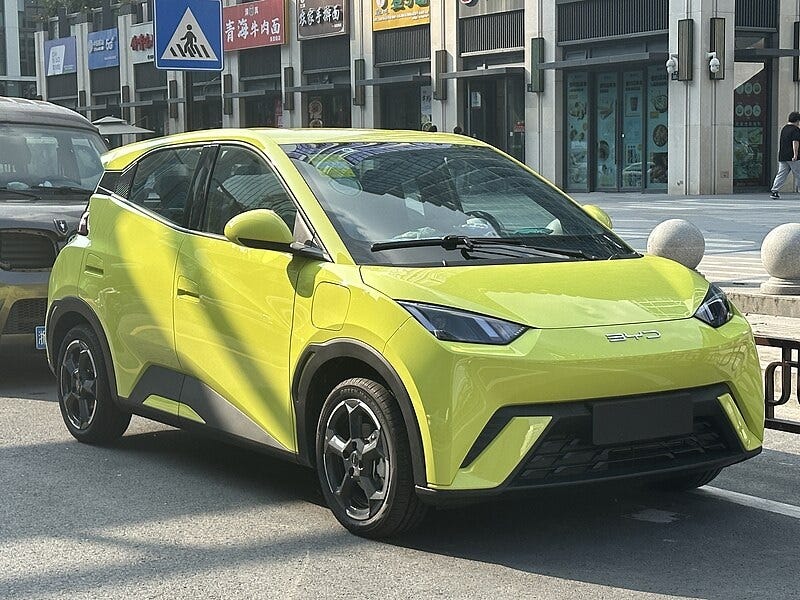Joe Biden Just Slapped 100 Percent Tariffs On Chinese EVs, So Isn't He Just Like Trump? (No.)
Bigger question: Will US manufacturers use the breathing room to get their EV shit together? Outlook uncertain.
President Joe Biden announced today that the US will impose a new 100 percent tariff on Chinese-built electric vehicles, along with higher tariffs on solar panels, EV batteries, computer chips, some medical equipment, and those great big cranes that load and unload container ships. As E&E News explains, the tariffs are primarily aimed at giving American manufacturers a leg up in the energy transition:
Duties will triple this year on EV batteries and other battery parts, to 25 percent. The same 25 percent rate will be imposed on some steel and aluminum products. A 25 percent duty will also go into force this year for a host of critical minerals essential to battery production, including cobalt, manganese and zinc; the same tariff rate will be put on natural graphite and permanent magnets in 2026.
So hang on here, doesn’t that make Joe Biden just like Donald Trump, who tried to use broad tariffs on agricultural products and damn near everything to make American stuff great again? Not so much, actually, since as the Washington Post points out (gift link), Trump slapped tariffs on about two-thirds of all Chinese imports, and now is calling for a 60 percent tariff on every Chinese product. Remember how popular those tariffs were, hurting American farmers and leading Trump to offer bailout payments to offset some of the losses, for some farmers, especially Big Ag donors?
By contrast, White House officials say Biden’s tariffs are targeted to specific sectors where China has been taking liberties and using state subsidies for unfair competition. Basically, the tariffs are an adjunct to Biden’s trade policy that’s already been enacted in the Bipartisan Infrastructure Law, the Inflation Reduction Act, and the CHIPS and Science Act. The idea is to use both the tariffs and the incentives in those laws to boost US manufacturing in sectors like
advanced computer chips, low-carbon energy and key industrial materials such as steel and aluminum. Nearly $1.5 trillion of public and private funds have been channeled into these industries in the past few years.
Oh boy, don’t get us started on all the cool shit on the way with super low-carbon production of steel and aluminum, and even cement. Here, we’ll link to another Volts podcast and transcript and call ourselves satisfied.
Announcing the new trade policy at the White House today, Biden pointed out that the tariffs, combined with incentives passed by Congress, were “specific and targeted,” in contrast to the broad tariffs of the Trump administration.
“My predecessor promised to increase American exports and boost manufacturing, but he did neither. He failed. […] China’s imports from America barely budged [under Trump]. And now Trump and his MAGA Republicans want across the board tariffs on all imports from all countries. […] That would drive up costs for American families an average of $1,500 per year, every year. He simply doesn’t get it.”
The new EV tariffs — quadruple the current already-high 25 percent tariff that has so far mostly kept Chinese EVs out of the American market — are meant to give American manufacturers time to get their own electric models on the market.
As we’ve discussed previously, there have been a few bumps along that road, like the industry’s initial impulse to copy what worked well with gasoline models: great big EV trucks like Ford’s F-150 Lighting — very good but pricey — and GM’s gargantuan Hummer EV, which nobody fucking needs and are you even kidding us? In the first quarter of the year, the Hummer EV only sold around 2,000 units. That was up from two trucks produced and sold at the end of 2023, leading to waggish headlines about Hummer EV sales skyrocketing “by 83,300%.”
Ford announced in March that it is shifting gears (which EVs don’t need) to developing a small, inexpensive EV that can compete with Chinese cars if they ever get here, and on the world market. That might work if Ford can do a good basic EV, but no American manufacturer is likely to come up with anything like BYD’s Seagull, a tiny city car that sells for around $12,000 over there, and is actually a pretty good little car, say reviewers.
GM’s EV plans were embuggered by problems manufacturing its Ultium battery platform, although production seems to be getting back on track, with plans to double EV production by the end of the summer. And hopefully not the way that all those Hummers increased the percentages. That should include the Chevy Equinox EV sometime in “mid-2024” (oh, that’s soon!), with 300 miles of range at a pretty affordable price point of $35,000. Later in the year, it’ll be more big damn electric trucks, but also next year a new, upgraded version of the popular compact Bolt.
Currently, there are only two Chinese automakers selling EVs in the USA, Volvo — surprise, it was bought by China’s Geely Automobile Holdings a while back, though its HQ remains in Sweden — and Polestar, which is also a subsidiary of Geely. Both of them will continue to be made in the US, however, so no tariffs on them.
Can the US auto industry get its own transition to EVs together enough to stay competitive? Considering how great US automakers did building small cars to meet the challenge from Japan in the 1970s (a rusted-out Chevette says hi!), let’s hope they do much better this time.
Oh, also, Donald Trump has his own promise to save the US auto industry, which was as vague as anything he ever says. At his Hannibal Lecter rally in New Jersey over the weekend, Trump said, “[Biden] says he’s going to put a 100 percent tariff on all Chinese electric vehicles. Isn’t that nice. I will put a 200 percent tax on every car that comes in.”
Every Chinese EV, or every imported car from anywhere? Who knows! It’s Trump, and that’s his plan. It’ll be the best ever.
[WaPo (gift link) / AP / E&E News / Volts / Electrek / Photo: “Quzhouliulian,” Creative Commons License 4.0]
Yr Wonkette is funded entirely by reader donations. If you can, please subscribe, or if a one-time donation works better for you, here is a place to do that!







The first Camrys were being imported to the US in 1983, while GM was trying to sell us the Chevy Citation, Pontiac Phoenix, and the Buick Whateveritwas.
Good Motor Trend headline: GM's X-Cars: Anatomy of a Miserable Failure
https://www.motortrend.com/features/gm-x-cars-chevrolet-citation-oldsmobile-buick-pontiac-photos-history/
Oh, son of a gun. I had completely forgotten that the Chevette was also available for a time with a 50-HP diesel engine made by Isuzu.
The diesel models were not available with AC.
https://www.reddit.com/r/spotted/comments/u0gc09/chevrolet_chevette_diesel_probably_the_only_one/